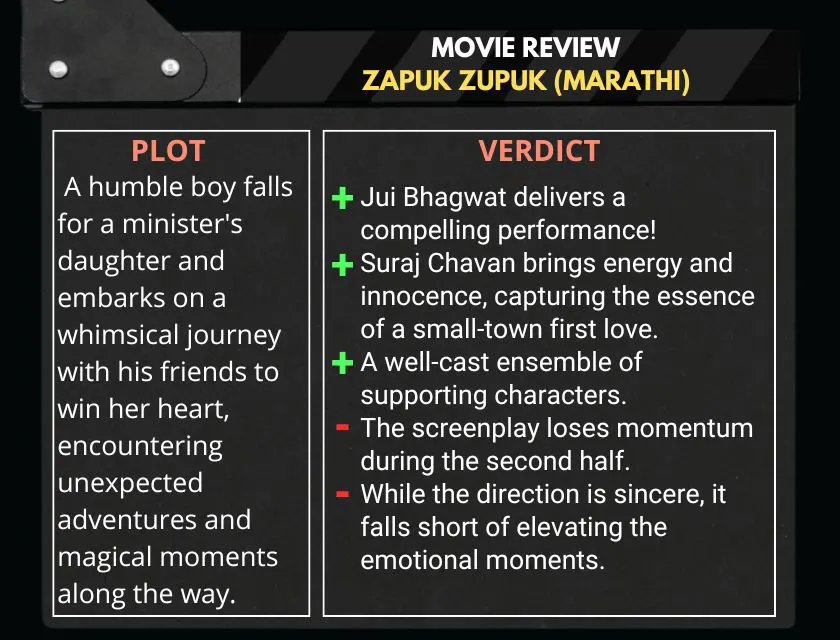Zapuk Zupuk: Marathi Movie Review
Rating: ⭐⭐1/2
Plot: A humble boy falls for a minister’s daughter and embarks on a whimsical journey with his friends to win her heart, encountering unexpected adventures and magical moments along the way.
Read more Marathi movie reviews here.
Zapuk Zupuk: Marathi Movie Review
Kedar Shinde, a celebrated artist in Marathi theatre and cinema, is known for his unique blend of humor, rooted storytelling, and cultural sensibilities. With a legacy that includes hits like Aga Bai Arrecha! and Baipan Bhari Deva, Shinde has a flair for capturing the everyday eccentricities of Maharashtrian life with warmth and wit.
The idea for Zapuk Zupuk was born over two decades ago—in 2004—when Shinde first imagined a whimsical love story centered on an underdog who dreams big despite his humble background. However, the story stayed in his vault for years, waiting for the right time and face to bring it to life. That moment arrived when Suraj Chavan won Bigg Boss Marathi Season 5. Impressed by Chavan’s raw screen presence and connect with the masses, Shinde decided to finally make the film, tailoring the role specifically for him.
Backing this passion project is Jio Studios, a production house that has been steadily expanding in Marathi cinema with films like Baipan Bhari Deva and Jhimma 2. Their involvement brings both reach and finesse, offering a platform for regional voices while allowing directors like Shinde to stay true to their storytelling roots. The result is not just a romantic comedy, but a heartfelt tribute to folk traditions, small-town dreams, and the ordinary heroes that Shinde has always celebrated.
Narayani (Jui Bhagwat), the daughter of local MLA Pankajrao, returns to her native village after completing education in Mumbai. Her arrival disrupts a house already brimming with hidden agendas. Pankajrao’s second wife has her own ambitions—chief among them to drive a rift between Narayani and her father, so she can tighten her control over the house. Adding to the mix is Rajkumar, the second wife’s controlling nephew, who uses Pankajrao’s political power to bully the villagers.
Enter Suraj (Suraj Chavan), a spirited and imaginative young man who entertains the local children with tales of Surajveer—a heroic alter ego who saves his people from demons. These stories aren’t just fun; they’re a lifeline for the village kids who’ve long been labelled outcasts by their teachers.
When Narayani takes charge of reforming the local school, she connects with these “mastikhor” students. With Suraj’s help, she guides them to pass their unit test. This journey brings Narayani and Suraj closer, and soon, Suraj finds himself falling in love with her.
As their bond grows, we are pulled into Narayani’s past—a high-school romance that ended in heartbreak, prompting her departure to Mumbai. What she doesn’t know is that her former lover, Shekhar, never left the village and has since been brooding over his lost love.
Meanwhile, back at home, her stepmother has already devised a plan to marry her off to Rajkumar, tightening the noose of familial control.
What unfolds next is a mix of mistaken identities, heartfelt confessions, and shifting loyalties. All this leading to the ultimate question: who will Narayani choose?
Jui Bhagwat carries the emotional weight of the film with grace. As Narayani, she balances resilience and vulnerability with poise. Her body language reflects both a sense of purpose and the burden of emotional past. Whether she’s tackling power games at home, mentoring children in the classroom or handling her personal life, Jui’s performance stays grounded. She never lets it tipping into melodrama.
Suraj Chavan delivers a breakout performance as the affable and imaginative Suraj. His portrayal of a semi-literate dreamer who becomes a local hero through storytelling is equally endearing and earnest. Suraj’s wide-eyed innocence never feels naive, and his chemistry with the children is refreshingly natural. There’s a moment when he watches Narayani from afar, unable to utter his feelings, that’s heartbreaking! He lets his vulnerability show without overplaying it.
Indraniel Kamat, in the role of Shekhar, brings intensity to a character torn between regret and hope. His restrained dialogue delivery and expressive eyes hint at a man who has lived with guilt far too long.
Milind Gawali, as MLA Pankajrao, brings depth to a conflicted father figure caught between loyalty to his daughter and the manipulations of his second wife. His arc is subtle but crucial, and Gawali’s performance adds texture to the political undercurrents in the story.
Deepali Pansare, playing the scheming stepmother, leans into the archetype but avoids caricature. Her performance feels calculated in the best sense. There’s a coolness to her gaze and a sharpness in her tone that sells the character’s intent without spelling it out.
Finally, Hemant Pharande as Rajkumar plays the entitled village brat with the kind of reckless energy that makes you bristle. He’s a force of disruption, and the smirking menace he brings makes him easy to despise—precisely what the role demands.
Zapuk Zupuk is a heartfelt rural drama that blends nostalgia, innocence, and a dash of folklore into a coming-of-age tale. It may not reinvent the wheel narratively. But its sincerity, strong performances, and rooted storytelling give it a charm. The film thrives on its emotional core and cultural flavour, even if the pacing and predictability weigh it down at times. For those who appreciate stories about small villages, big emotions, and the power of imagination, Zapuk Zupuk offers a warm, endearing ride.





